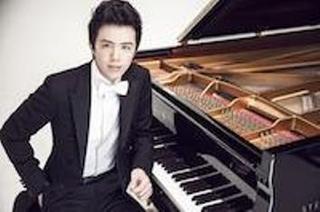|
Back
The Youth’s Magic Sounds New York
Isaac Stern Auditorium, Carnegie Hall
07/11/2015 - & July 10 (Purchase), 15 (Beijing), 17 (Shanghai), 19 (Suzhou), 21 (Xi’an), 23 (Shenzhen), 24 (Guangzhou), 26 (Hong Kong), 2015
Tan Dun: Passacaglia: Secret of Wind and Birds (World Premiere)
Ludwig van Beethoven: Piano Concerto No. 5 in E-flat Major “Emperor”, Opus 73
Hector Berlioz: Symphony fantastique, Opus 14
YUNDI (Piano)
National Youth Orchestra of the United States of America, Charles Dutoit (Conductor)

Tan Dun (© Dong Hao)
What a wonderful world we live in when the National Youth Orchestra of the United States of America should have a Swiss-born conductor, commissioning a Chinese-born composer, with music from a Chinese pianist, music from Germany and France, and fully one-half of these “all-Americans”–dressed in dark blue, white and red–bore the most exotic international names.
But the world needs the “NYOOTUSOA”, just as they need youth orchestras from Asia and Europe. The 100-odd Americans, the best and brightest from across the land, get together each summer, under the aegis of Carnegie Hall’s Weill Music Institute, are coached by profesional colleagues, and then show their skills first in New York, and then to foreign climes. This year, to China: seven concerts to show off their own skills, and those of their Chinese stars.
Tan Dun is such a star. He has reached that pantheon of living composers who seems unlimited in inspiration. Or, more specifically, unlimited in concepts. In his opera Marco Polo, he was the first to include Western, Chinese, Mongolian, Tibetan and Central Asian instruments in a single work. His Paper Concerto, his Water Concerto, his recent First Internet Symphony were all greeted with elation by audiences who appreciate his unfettered originality.
That was true with last night’s premiere, commissioned by Carnegie Hall, Passacaglia: Secret of Wind and Water. In less than 15 minutes, Tan Dun introduced audience participation (smartphones giving a “poetic forest” of birds through Chinese instruments), inspirations of birds and winds with “melody, rhythm and color”, vocal chanting, an evolution of those chirpings to a Bernstein-like jazzy finale (Mahler and Bernstein are Tan Dun’s avowed icons), a quote from Leonardo da Vinci...
And all of this in the form of a 17th Century passacaglia: nine repetitions of a seven-note them in different forms.
Whew!! That’s a lot of baggage for this young orchestra to carry. And indeed, Tan Dun was able to pull it off with a work that was simple, rather exciting and as undissonant as any 21st Century work has a right to be.
But was it music meant to last? Did it have more dimensions than the composer’s multitudinous verbal explanation? One is doubtful. I have heard many works by Tan Dun since living in Hong Kong many years ago, and remember the ideas behind the music. The music itself escapes me. Yet what is one person’s opinion against the acclamation of the world?

YUNDI (© Courtesy of the Artist)
Equal acclamation has greeted Yundi Li (who prefers to be called YUNDI in capital letters), ever since he was the youngest First Prize-winner in the 14th International Chopin Competition. For the next decade (he is in his early 30’s), Mr. Li has performed throughout the world, ceaselessly, taking on the most challenging works of the 19th Century, recording solos and concerti.
Hearing a recording of Beethoven’s Fifth Concerto with the Berlin Philharmonic, I expected an exciting, perhaps even bombastic performance of the piece under Charles Dutoit last night. The result, though, was unexpected.
In a way, it was abolutely beautiful. Mr. Li’s technique is faultless, the frequent octave runs, the opening arpeggios, the cadenza, were all pellucid, elegant, precise. But where, one might ask, was Ludwig van Beethoven?
The opening was magesterial, yet that inner Promethean power was missing. Mr. Li was never eccentric, but rarely personal. This was a soothing, confident Allegro, yet never actually moving. The second movement was actually beautiful, he played it like a Chopin nocturne, the sounds were crystal clear, the feeling was poetic, he never retarded the lines, yet he gave the impresson of improvisation. And for the finale, Mr. Li gave vent to a more bumptious mood.
One couldn’t help admiring that crystaline sound, those legatos gave almost a violinistic tone to the Steinway. At the same time, one couldn’t help but think that Yundi Li was thinking Chopin as he played the Beethoven.
Indeed, he is giving an all-Chopin recital later this year in Carnegie Hall. It will be sold out, and should be. He is very much the Romantic pianist.
For both these works, the young NYOOTUSOA was more than able. The finale was a more ambitious challenge.
Charles Dutoit has conducted the Berlioz Symphonie fantastique with every orchestra has ever encountered. And the ending is unfailingly exciting. Before that, Berlioz’s fantasy of drugs, sex and murder can meander and ramble. Mr. Dutoit never allows that to happen, but last night he needed an orchestra which responded with alacrity.
And yes, the National Youth Orchestra played their hearts out, no goofs were heard, Mr. Dutoit kept this young players balanced (always an arduous job in this work), and the sounds were clear.
Missing, inevitably, was the violence, the danger, the pinpoint accuracy of those revolutionary string effects in the first three movements. The ending is foolproof, with the result of a standing ovation (and a terrific encore from Bizet’s L’Arlésienne). For these players, the award wasn’t from the audience, but from Mr. Dutoit, who applauded them with enthusiasm.
Harry Rolnick
|